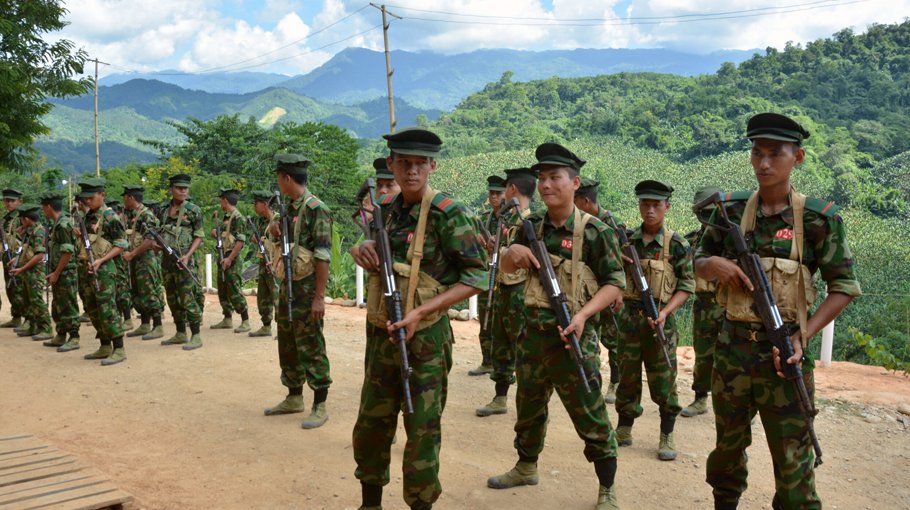Junta Forces’ Incursion: Bangladesh’s Balancing Act

The abrupt surge of Burmese Junta Forces into the border district of Tamru in Bangladesh has sparked a new wave of apprehension and examination, creating an atmosphere of unease in the area. Since mid-January 2024, more than 350 members of the Burmese military junta, known as the Burmese Junta Forces, have fled to Bangladesh for safety due to ongoing conflicts with the Arakan Army in Myanmar's Rakhine state. The influx of these individuals, primarily consisting of members ofthe Burmese border police(BJP), has evoked recollections of previous acts of violence and prompted inquiries over their intentions and potential consequences for the security and stability of Bangladesh. In light of past animosities and ongoing disputes, the emergence of the Burmese Junta Forces poses a multifaceted and pressing issue, requiring thorough analysis and resolute response from all parties concerned.
Bangladesh finds itself in a perilous situation as it deals with the complicated aftermath of regional violence and political upheaval, caused by the sudden arrival of more than 350 members of the BurmiseJunta Forces in the border district of Tamru. These folks are coming from the conflict-ridden region of Rakhine state in Myanmar, where confrontations between the Arakan Army and the Burmese military junta have intensified tensions and caused a large number of people to be displaced. They are arriving in Bangladesh in search of safety and protection. Nevertheless, the existence of these individuals gives rise to several complex inquiries and ethical quandaries for both Bangladesh and the global world.
Now a pertinent question is: should these individuals be sent to Myanmar, or should they be held responsible for their claimed participation in previous acts of brutality, especially considering their apparent association with the Burmese military regime and the BJP? The predicament confronting Bangladesh highlights the intricacies of humanitarian emergencies and the pressing requirement for synchronized, empathetic actions that give precedence to both fairness and the safeguarding of human rights. Amidst the global community's efforts to understand the consequences of this large number of people coming in, Bangladesh finds itself in a crucial position, carefully managing the difficult task of fulfilling its responsibilities as a host country while also maintaining its dedication to fairness and responsibility.
The presence of these persons in Bangladesh gives rise to considerable apprehension, especially considering their alleged connections with the Burmese military regime and the BJP (Burmese border guards). This serves as a clear and direct reminder of the Rohingya crisis in 2017, during which the joint efforts of the Burmese military and these specific forces led to the widespread slaughter and forced displacement of Rohingya Muslims. As a result, about one million individuals were compelled to seek shelter in Bangladesh.
These military men who are leaving are heavily burdened by the possibility of being involved in the Rohingya massacre. Did they have direct involvement in the heinous acts that occurred on August 24 and 25, 2017, or do they possess information about those who did? Can the verification of their identities be ensured, or are there individuals among them who are covert operatives of the Burmese military, constituting a potential danger to the security of Bangladesh? These questions need to be addressed.
Currently, the government of Bangladesh is closely monitoring the situation about the entry of the Burmese Junta Forces. They are maintaining regular communication with the Myanmar government to find ways to resolve this complicated matter. Bangladeshi authorities are actively pursuing diplomatic engagement and collaboration to address cross-border concerns. They are committed to finding mutually advantageous solutions that prioritize justice, security, and regional stability. Bangladesh seeks to address this complex issue through continuous bilateral discussions and diplomatic initiatives, potentially with the support of international organizations. The goal is to handle the situation with skill and diplomacy, promoting productive dialogue while protecting the interests and well-being of all parties involved.
Nevertheless, the Bangladesh government is currently facing a critical decision point, as security specialists are recommending two contrasting courses of action. One alternative is repatriation, which may be pursued through diplomatic discussions with the Burmese regime. Advocates of this strategy contend that a prompt resolution is necessary, supporting the repatriation of these persons to Myanmar as a way to mitigate the strain on Bangladesh's resources and preserve diplomatic ties with its neighboring country.
Nevertheless, a significant number of experts prefer a prudent and calculated approach. They contend that Bangladesh must initially establish the identity of these fleeing military personnel and conduct an inquiry into their purported participation in previous acts of extreme cruelty. An educated judgment on their repatriation or punishment can only be made by conducting a comprehensive analysis of their involvement in the Rohingya issue.
Furthermore, there is a demand for global participation in this issue. Bangladesh may consider soliciting the aid of the United Nations, the International Court of Justice (ICJ), or the International Criminal Court (ICC) to guarantee a just and transparent procedure. Through active participation in the global community, Bangladesh may exhibit its dedication to maintaining fairness and responsibility, while simultaneously protecting its interests and security.
Bangladesh is confronted with a challenging dilemma. It necessitates a nuanced equilibrium between humanitarian considerations, diplomatic ties, and the quest for justice. The suffering of the Rohingya people is a stark reminder of the negative outcomes that result from not taking action and allowing impunity. Bangladesh must neither disregard past crimes nor overlook the possible dangers associated with the presence of military personnel seeking refuge within its borders.
Bangladesh must adhere to its dedication to human rights and justice while maneuveringthrough the intricacies of regional politics to choose the best course of action. The entire community is closely observing the current situation, and the decisions made today will have significant and long-lasting consequences for Bangladesh, Myanmar, and the wider international community. This is a critical time that requires bravery, empathy, and steadfast determination.
The writer is a Professor in the Department of Public Administration at the
University of Rajshahi.



